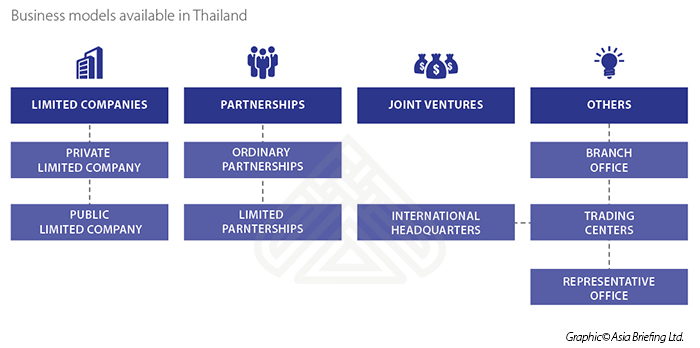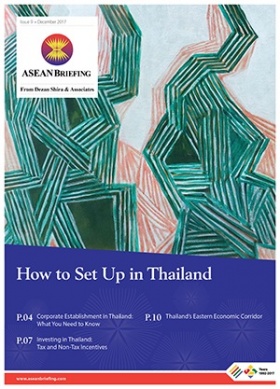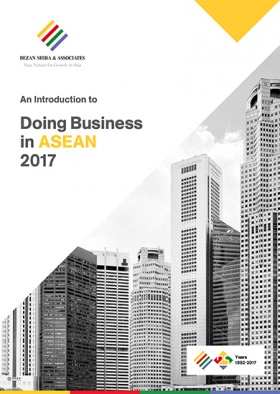Corporate Establishment in Thailand: What You Need to Know
Foreign investors contemplating new business undertakings in Thailand should carefully consider the Thai Foreign Business Act B.E. 2542 (FBA) before setting up operations in the country.
The FBA is the main law that governs the extent of foreign participation in business activities in Thailand; it limits the rights of foreigners to engage in certain businesses, commercial, and industrial activities in the country.Under the FBA, a business entity is deemed ‘foreign’ if:
- It is registered under the law of another country – including all branches, representative offices and regional offices of overseas companies operating in Thailand; or
- It is registered under Thai law
- with 50 percent or more of its capital shares held by non-Thais (individuals or business entities);
- with 50 percent of its capital invested by non-Thais; or
- has foreign individuals as its managing partner or manager.
Determining the right business model
A foreign investor must carefully consider the following before choosing the right business model:
- Restrictions on foreign ownership in different sectors, under various laws and policies;
- Only Thai companies are eligible for promotion by the BOI under the Investment Promotion Act;
- A foreign company is not liable for the functions performed by its subsidiary in Thailand but is liable for the functions performed by its branch office;
- Generally, it is easier for a Thai company to obtain permits, licenses and government approvals than it is for a branch office as documents of a branch often require notarization by a Thai embassy abroad;
- The possible application of foreign trade agreements;
- Foreign companies carrying out business in Thailand are subject to Thai Corporate Income Tax (CIT), value-added tax (VAT), and other generally applicable taxes;
- The laws of foreign jurisdictions may provide a tax credit or deduction for taxes paid by a branch or subsidiary in Thailand;
- Thailand has double taxation treaties with more than 50 foreign countries, some of which provide a more favorable treatment of remittances than others.
Common business models
There are different business models available in Thailand that may be of interest to foreigners planning their business in the country.
In this chapter, we explore limited companies in greater depth as they are one of the most popular options for setting up in Thailand, but also describe basic considerations for Branch Offices and Representative Offices.
Limited companies
Limited companies are the most preferred and popular route for setting up a business in Thailand. This is mainly because of the similarity of its structure to corporations in other countries. All limited companies have directors, shareholders (both local and foreign), promoters, and limited liability.
Thailand recognizes two types of limited companies – private or closely held companies, governed by the Civil and Commercial Code (CCC); and public companies, governed by the Public Company Act.
- Private limited company
A private limited company formed by registrations with the Department of Business Development (DBD), under the Ministry of Commerce (MOC). The structure of a private limited company must include a minimum of three shareholders who enjoy limited liability in on par with the values of their shares. Directors, on the other hand, generally have no special liability for the debts of the company in the case of bankruptcy or liquidation, unless they personally cause loss to the company, act out of the company’s objectives, or against the law.
Establishment procedure
Corporate name registration
In order to set up a private limited company in Thailand, the promoters or shareholders must get an approval and reservation in the name of the company. For reference, investors may observe the name reservation guidelines of the business development office under the MOC. The approved corporate name reservation is valid for 30 days, with no extension.
Registration of the Memorandum of Association
A Memorandum of Association (MOA) must be filed with the DBD after the name reservation has been approved. There must be at least three promoters to prepare and register the MOA. The MOA must include the following:
- The name of the proposed company and its address;
- The proposed company’s business objectives;
- A declaration of limitation of shareholders’ liability;
- The amount of share capital to be registered, and value per share;
- Names, addresses, occupations, and signature of the shareholders and number of shares subscribed by each of them; and
- The registration of incorporation for the company.
Convening a statutory meeting
Once the share structure has been defined under the Memorandum of Association, a statutory meeting of all shareholders is held to consider the following:
- The approval of articles of incorporation and by-laws;
- Appointment of the board of directors, and the auditors of the company;
- Ratification of the business activities previously carried on by the promoters;
- Establishment of preference shares, if any; and
- The number of shares to be allotted as paid up other than in cash if any.
Company registration
To establish a Thai limited company it has to be registered with the Thai government. The company registration fee is THB 5,500 (US$169) per million THB of registered capital.
Value Added Tax (VAT) or specific business tax
- Public limited company
To incorporate a public company, the investor(s) must state the purpose of offering shares to the public and the liability limit of its shareholders in the Articles of Association. There must be at least 15 shareholders to apply to form a public limited company, and each must subscribe to at least 5 percent of the total shares. Additionally, at least half of these shareholders must be a resident in Thailand.
The company’s legal existence commences with the completion of the registration process, which is similar to that of the private limited company. In the following period, the number of shareholders must continue to be 15 or more. If the public limited company matches the requirements made by law, it can go public on the stock exchange of Thailand.
The registration fee is THB 1,000 (US$30) per million THB of registered capital.
- Branch office
A foreign company may use a branch office (BO) to establish its presence in Thailand. Legally a BO holds the same position as its head office and is considered as having a foreign status. As a result, its business activities are restricted and subject to conditions and requirements under the FBA. Further, the head office and other branches are jointly held responsible for all liabilities of the BO.
A BO must have at least one branch office manager to be in charge of operations in Thailand.Foreign companies may choose not to register their BO’s for carrying out operations in Thailand. However, if its activities fall under the FBA restricted list, it will have to apply for the foreign business license. Similarly, it may have to carry out special registrations to comply with certain other laws and regulations such as VAT registration, the taxpayer identification card requirement, as well as the commercial registration certificate requirement.
- Representative office
Before launching a registered company in Thailand, a foreign company may test the size of the Thai market by establishing a limited presence in the country through a representative office (RO).
The function of a RO is limited to rendering non-revenue-raising services on behalf of its head office. A representative office cannot generate income from its business activities and is not permitted to receive any purchase order, or sign sale and purchase agreement, or negotiate business with any person. It can only engage in a limited range of activities such as sourcing of local goods or services in Thailand, reporting local business development and activities to its head office, and engaging with clients on behalf of its head office.
Foreign companies must obtain a foreign business license before establishing a RO in Thailand, as it is considered a service business under Schedule 3 of the FBA.
 This article is an excerpt from the December 2017 issue of ASEAN Briefing magazine, titled “How to Set Up in Thailand” In this issue, we analyze the various market entry options available for investors interested in expanding to Thailand. We also discuss the various tax and non-tax incentives on offer for foreign investors in the kingdom. Finally, we discuss the salient features of Thailand’s EEC development plan and highlight the key incentives on offer for overseas investors.
This article is an excerpt from the December 2017 issue of ASEAN Briefing magazine, titled “How to Set Up in Thailand” In this issue, we analyze the various market entry options available for investors interested in expanding to Thailand. We also discuss the various tax and non-tax incentives on offer for foreign investors in the kingdom. Finally, we discuss the salient features of Thailand’s EEC development plan and highlight the key incentives on offer for overseas investors.
About Us
ASEAN Briefing is produced by Dezan Shira & Associates. The firm assists foreign investors throughout Asia and maintains offices throughout ASEAN, including in Singapore, Hanoi, Ho Chi Minh City and Jakarta. Please contact us at asia@dezshira.com or visit our website at www.dezshira.com.
- Previous Article Thailand’s Automotive Industry: Opportunities and Incentives
- Next Article Cambodia Grants Validation to European Union Patents














